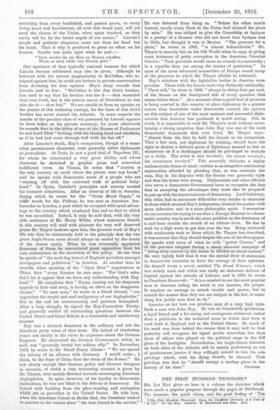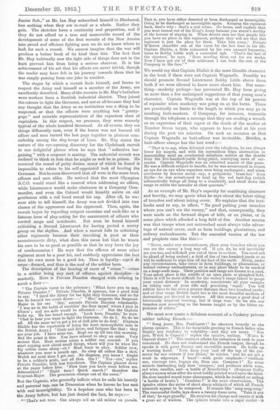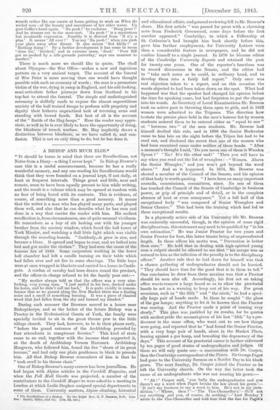THE FIRST HUNDRED THOUSAND.*
Mu. IAN My gives us here in a volume the sketches which have made a popular progress through the pages of Blackwood. The humour, the quick vision, and the good feeling of " The
The First Hundred Thousand : being the Unofficial Ohroniete of a Unit 01 ".IE (1)." By Ian Hay. London : W. Blackwood and Sons. [08.1 Junior Sub.," as Mr. Ian Hay subscribed himself in Blackwood, lose nothing when they are re-read as a whole. Rather they gain. The sketches have a continuity and proportion, and if they do not afford us a true and memorable record of the development of some of the first recruits of the New Armies into proud and efficient fighting men we do not know where to look for such a record. We cannot imagine that the war will produce a better book of its kind than this. The fact that Mr. Hay habitually sees the light side of things does not in the least prevent him from being a serious observer. It is the achievement of his art that his effects are never trivial, though the reader may have felt in his journey towards them that he was simply passing from one joke to another.
The stages by which a recruit finds himself, and learns to respect the Army and himself as a member of the Army, are excellently described. Many of the recruits in Mr. Hay's battalion were workers from a Scottish industrial district. They joined the colours to fight the Germans, and not at all because they had any thought that the Army as an institution was a thing to be respected, or that the officers were anything but " gentry- pups " and suitable representatives of the rapacious class of capitalists. In this respect, we presume, they were scarcely typical of the whole hundred thousand. At all events, they see things differently now, even if the lesson was not learned till officer and man turned the last page together in glorious com- radeship among the slag-heaps of Loos. Mr. Hay states the nature of the eye-opening discovery for the Clydebank recruit in one delightful phrase when he says that " collective bar- gaining " with a sergeant is mutiny. The industrial recruit was inclined to think at first that he might as well be in prison. He resented the round of petty duties, many of which he found it impossible to relate to his self-appointed task of beating the Germans. But he soon discovered that all were in the same boat, officers and men alike. He noticed that the most Olympian N.C.O. would stand like a ramrod when addressing an officer, while Lieutenants would make obeisance to a Company Com- mander, and even the Colonel would humbly salute an old gentleman with a red band round his cap. After all, he was soon able to tell himself, the Army was not divided into two classes of the oppressors and the oppressed. Then, again, the recruit began by regarding outpost exercises and such-like as a fatuous form of play-acting for the amusement of officers who carried maps and notebooks. But soon he found himself criticizing a Second Lieutenant for having posted a sentry group on the skyline. And when a recruit falls to criticizing other regiments because their marching is poor or their accoutrements dirty, what does this mean but that he wants his own to be as good as possible so that he may have the joy of condescension ? He says that the officers of some other regiment must be a poor lot, and suddenly appreciates the fact that his own must be a good lot. Thus is loyalty—esprit de
corps—formed, and thus is the soul of the soldier born.
The description of the heariug of cases of " crime "—crime in a soldier being any sort of offence against discipline--is masterly. Here is Private Dunshie charged with refusing to scrub a floor :— " The Captain tame to the prisoner What have you to sal.,
Private Dunshie ? ' Private Dunshie, it appears, has a good deal to say. ' I jined the Affray for tae fight they Germane, and no for tee be learned tee scrub floors—" girr," suggests the Sergeant- maj„ in his ear. Sirr," amends Private Dunshie reluctantly. ' I was no in the habit of scrubbuf the floor 'wiser where I stay in Glesca' ; and ma avife would be affronted—' But the Captain looks up. He has heard enough. Look here, Dunshie,' he says. Glad to hear you want to fight the Germans. So do L So do we all. All the same we've got a lot of dull jobs to do first.' (Captain Blaikie has the reputation of being the most monosyllabic man in the British Army.) ' Coals and floors, and fatigues like that : they are your job. I have mine too. Kept me up till two this morning. But the point is this. You have refused to obey an order. Very serious that Most serious crime a soldier can commit. If you start arguing now about small things, whore will you be when the big orders come along—eh ? Must learn to obey. Soldier now, whatever you were a month ago. So obey all orders like a shot. Watch me next time I got one. No disgrace, you know 1 Ought
to be a soldier's pride, and all that. See ? ' Yes—sirr,' replies Private Dunshie, with less truculence. The Captain glances down at the paper before him. ' First tune you have come before me. Admonished I " Right turn I Quick march I ' thunders the Sergeant-Major. The procession clumps out of the room."
But the Captain, who generally inflicts what he calls his homely and paternal tap, can be Draconian when he knows he has met with real incorrigibility. To a hopeless case who has been in the Army before, but has just denied the fact, he sayss:- "' That's not true. Can always tell an old soldier on parade. Fact is, you have either deserted or been discharged as incorrigible. Going to be discharged as incorrigible again. Keeping the regiment back, that's why : that's a real crime. Go home, and explain that you wore turned out of the King's Army because you weren't worthy of the honour of staying in. When decent men see that people like you have no place in this regiment, perhaps they will see that this regiment is just the place for them. Take him away.' Private M'Queen shambles out of the room for the last time in his life. Captain Blailcie, a little exhausted by his own unusual loquacity, turns to Bobby Little with a contented sigh. ' That's the last of
the shysters,' ho says. Been weeding them out for six weeks. Now I have got rid of that nobleman I can look the rest of the Company in the faoe.' " We would say that Captain Blaikie is the most likeable character in the book if there were not Captain Wagstaffe. Possibly we should promote Second Lieutenant Bobby Little above them both if we were allowed to know more about him. But some- thing—modesty perhaps—has prevented Mr. Hay from giving us more than a few undesigned suggestions of that young man's character. Captain Wagstaff° was at the top of his powers of rejoinder when musketry was going on at the butts. There are practically no limits to the length to which you may go in insulting butt-markers. C Company, for instance, transmits through the telephone a message that they are sending a wreath as an expression of their regret at the death of the marker at Number Seven target, who appears to have died at his post during the past ten minutes. On such an occasion as that Captain Wagstaff° as butt-officer was invincible. Besides, a butt-officer always has the last word :— " That is to say, when defeated over the telephone, ho can always lower his targets, and with his myrmidons feign abstraction or insensibility until an overheated subaltern arrives at the double from the five-hundred-yards firing-point, convoying news of sur- render. Captain Wagstaffe was an admitted master of this game. He was a difficult subject to handle, for he was accustomed to return an eye for an eye when repartees were being exchanged ; and when overborne by heavier metal—say, a peripatetic ' brass-hat' from Hythe—he was accustomed to haul up the red butt-flag (which automatically brings all firing to a standstill), and stroll down the range to refute the intruder at close quarters."
As an example of Mr. Hay's capacity for combining clearness and brevity, we may quote what he says about the latest siting of trenches and about taking cover. He explains that the text- books used to say, in effect, " No good putting your trenches where you can't see the enemy," and that, consequently, they were made on the forward elopes of bills, or on plains, or in some place which afforded a long field of fire. Another maxim was that troops when not entrenched must always take advan- tage of natural cover, such as farm buildings, plantations, and railway embankments. But the amended version of the law and prophets runs like this :—.- "Never, under any circumstances, place your trenches where you inevitably can see the enemy a long way off. If you do, he will see you too, and will shell you out of them in no time. You need not bo afraid of being rushed ; a field of fire of two hundred yards or so will be sufficient to wipe him off tho face of the earth. Never, under any circumstances, take cover in farm buildings, or plantations, or behind railway embankments, or in any place likely to be marked on a large-scale map. Theis position and range are known to a yard. Your safest place is the middle of an open plain or ploughed field. There it will be more difficult for the enemy's range-takers to gauge your exact distance. In musketry, concentrate all your energies on taking care of your rifle and practising 'rapid.' You will seldom have to fire over a greater distance than two hunched yards ; and at that range British rapid fire is the most dreadful medium of destruction yet devised in warfare. AU this scraps a good deal of laboriously acquired learning, but it rings true. So we site our trenches now according to the lessons taught us by the bitter ex- perience of others."
We must now quote a delicious account of a Cockney private soldier talking French :— "' Bong j000r, Mrs. Pankhurst 1' he observes breezily to the plump epsciere. This is his invariable greeting to French ladies who display any tendency to volubility—and they are many. Bon jour, M'siou le Caporal ' replies the epicare, smiling. M'siou le Caporal desire ? ' The sergeant allows his reduction in rank to pass unnoticed. He does not understand the French tongue, though ho speaks it with groat fluency and incredible success. He holds up a warning hand. Now, keep your 'and off the tap of the gas- meter for one minute if you please,' he rejoins, and let me get a word in edgeways. I want '—with great emphasis—' vinblank one, vinroogo two, bogeys six, Dom one. Comproe ? ' By some miracle tluremiling lady does compree,' and produces white wine, red wino, candles, and—a bottle of Benedictine ! (Sergeant Coffin always names wines after the most boldly printed word upon the label. He once handed round some champagne, which he insisted on calling ' a bottle of brute.') Combine ? is the next observation. The ipiciere utters the series of short sharp sibilants of which all French numerals appear to be composed. It sounds like ' song-song-song' The resourceful Goffin lays down a twenty-franc note. Take it out of that,' he says grandly. He receives his change and counts it with a great air of wisdom. The epics.ege breaks lute a rapid recital—it sounds rather like our curate at home getting to work on When the wicked man—of the beauty and succulence of her other wares. 'Up
goes Goffin's hand again. Na pooh ' he exclaims. Bong jooer I' And he stumps out to the mess.oart. Na pooh,' is a mysterious but invaluable expression. Possibly it is derived from II n'y plus.' It means All over ! You say 'Na pooh ! when you push your plate away after dinner. It also means Not likely 1 ' or Nothing doing ! ' By a further development it has come to mean done for,' finished,' and in extreme eases, dead." Poor Bill got na-poohed by a rifle-grenade yesterday,' says one mourner to another."
There is much more we should like to quote. The chaff about Olympus—the War Office—makes a new and ingenious pattern on a very ancient target. The account of the funeral of Woe Peter is more moving than one would have thought possible with such an economy of words ; the man is a premature victim of the war, dying in Camp in England, and his odd-looking, semi-articulate father jonrneys down from Scotland in his top-hat to attend the funeral. The simple and undistinguished ceremony is skilfully made to expose the almost superstitious anxiety of the half-trained troops to perform with propriety and dignity their hitherto unpractised task of reversing arms and standing with bowed heads, But best of all is the account of the:` Battle of the Slag-heaps." Here the reader may appre- ciate, as well as he is ever likely to have' ave the opportunity of doing, the blindness of trench warfare. Mr. Hay implicitly draws a distinction 'between blindneSs. as we have called it, and con- fusion. That is not an cagy thing to do, but he has done it.




































 Previous page
Previous page